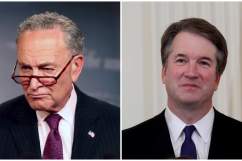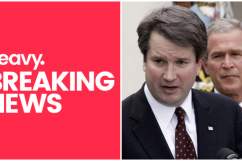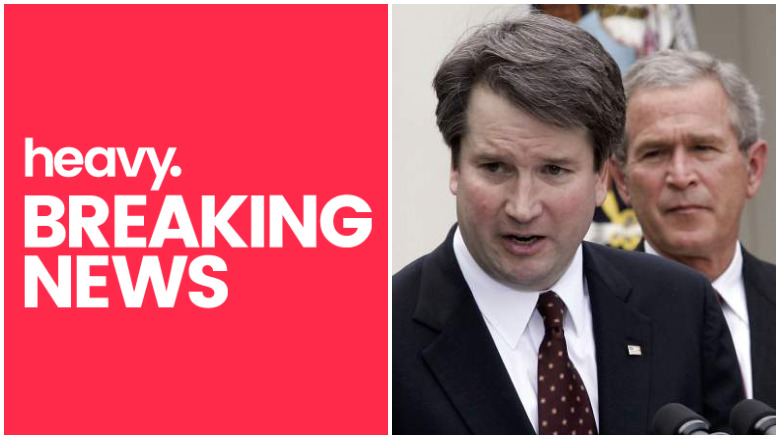
Getty Brett Kavanaugh's abortion ruling dissent has caused controversy.
Brett Kavanaugh, Donald Trump’s nominee to replace Anthony Kennedy on the U.S. Supreme Court, has been criticized by some conservatives and liberals for his handling of a recent case in which a 17-year-old immigrant wanted to have an abortion.
Both sides find things to dislike in the Kavanaugh dissent and what’s known about how he’d rule on abortion. He hasn’t said much specifically about Roe v. Wade though in public forums. He was cautious about what he said about Roe during his previous confirmation hearing to the federal bench, for example. Trump called Kavanaugh, a former Kennedy clerk, “a true thought leader among his peers” with a sharp legal mind.
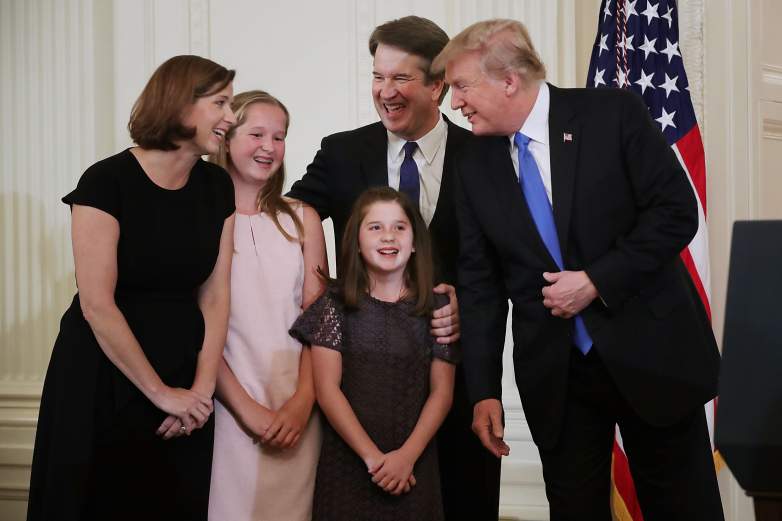
U.S. President Donald Trump (R), Judge Brett M. Kavanaugh (2nd R), his wife Ashley Estes Kavanaugh and their daughters, Margaret and Liza, share a laugh after Trump announced the judge as his nominee to the United States Supreme Court during an event in the East Room of the White House July 9, 2018 in Washington, DC.
Trump announced his choice on July 9, 2019 at 9 p.m. Eastern time. He kept his decision close to the vest throughout the day, although multiple news accounts reported that Kavanaugh and Thomas Hardiman were the finalists. Kavanaugh’s abortion stance is unlikely to cause as much controversy as the writings of another finalist, Amy Coney Barrett, would have caused. However, a Kavanaugh dissent on abortion has already caused some concern with conservatives and liberals, which is a tough task to pull off.
Some on the left are concerned the new Trump pick could join a more conservative court to overturn Roe v. Wade. The conservative criticism of Kavanaugh has focused on a perception that his dissent in an abortion case was not as strong as that of another conservative, mirroring conservative angst over a dissent he wrote on Obamacare. However, liberals are upset that Kavanaugh did not join the majority in both cases.
Kavanaugh is Catholic. He said in his nomination speech that he helps serve meals to the homeless at Catholic Charities, is a former altar boy, and is part of D.C.’s Catholic community.
Here’s what you need to know:
The Case Involves a Kavanaugh Dissent Over Whether the Government Needed to Allow an Undocumented Immigrant Teen to Have an Abortion
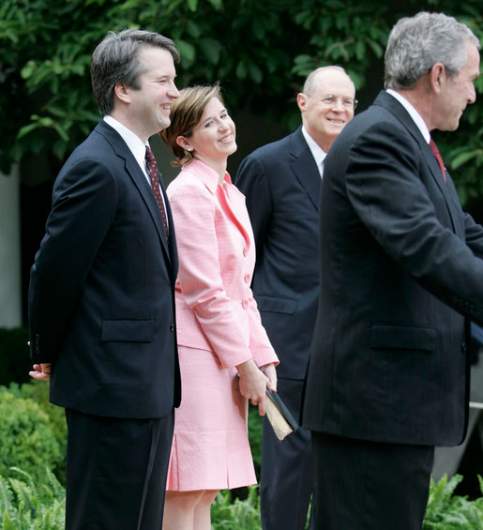
White HouseSwearing-in Ceremony for Brett Kavanaugh to the U.S. Court of Appeals for the District of Columbia with his wife Ashley Estes Kavanaugh.
The case in question is called Garza v. Hargan. An undocumented immigrant in federal custody wanted to have an abortion, and the case revolved around whether the government should allow her to do so. The D.C. Circuit ultimately ruled that the Trump administration should allow the woman to have an abortion. You can read the decisions in the Garza v. Hargan case here.
Kavanaugh dissented from that majority opinion. However, “unlike another conservative judge,” Kavanaugh “did not directly challenge her right to have an abortion under certain circumstances,” New York Magazine reported. That upsets conservatives, but Roe supporters aren’t happy, either, because Kavanaugh didn’t side with the majority ruling the teen should get the abortion.
“Brett Kavanaugh was all in to block a young, undocumented woman from accessing abortion and would happily overturn #RoevWade,” NARAL, which supports Roe, wrote on Twitter.
Conservative concern about Kavanaugh on abortion mirrors conservative concern about Kavanaugh on Obamacare; in both cases, Kavanaugh dissented, but he was not strong enough in his dissent in doing so for some conservatives. SCOTUS blog explained, “Kavanaugh noted that the government had conceded the teen’s right to an abortion. He went on to assert that delaying the procedure while the government sought a sponsor was permissible under the Supreme Court’s precedent because it did not impose an undue burden on that right.”
The basic concern that some conservatives have raised: They think that Kavanaugh did not take a strong enough position on the case. “This case exemplifies why Kavanaugh is not the best available Supreme Court prospect,” Philip Jauregui of the Judicial Action Group wrote to other conservatives in a memo, according to Politico.
Although Jauregui said Kavanaugh was “certainly not the worst judge” in the case, he raised concern that, in his view, Kavanaugh might not be “as constitutionally principled” as others.
In the case, Kavanaugh wrote, “The Government has permissible interests in favoring fetal life, protecting the best interests of a minor, and refraining from facilitating abortion,” adding that the majority’s stance was a “radical extension of the Supreme Court’s abortion jurisprudence.”
Kavanaugh Once Said He’d Respect Precedent on Abortion & But He Helped George W. Bush Pick Conservative Judges
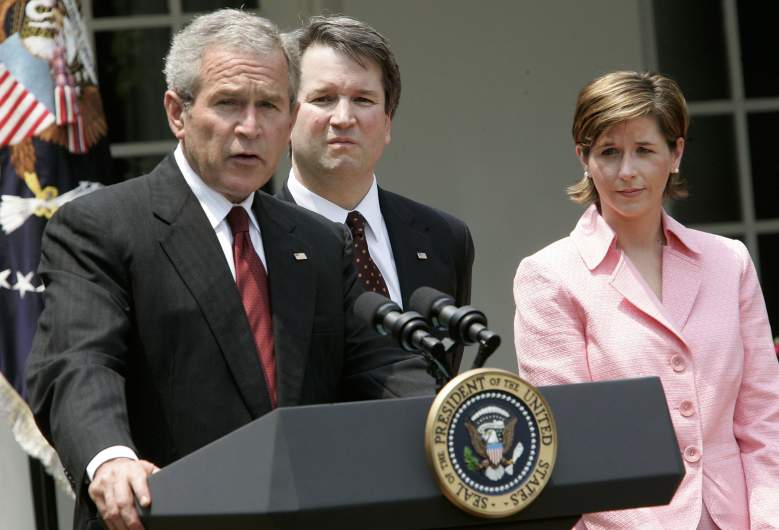
GettyThen-President George W. Bush speaks during the swearing ceremony for Brett Kavanaugh (C) to be a judge in 2006.
Some conservatives are also concerned by comments Kavanaugh made on abortion at his confirmation hearing to the federal bench. Kavanaugh “told senators during his DC Circuit confirmation hearing that he’d respect precedent on abortion and declined to share his views on Roe v. Wade,” reported Vox. (That stands in contrast, for example, to Amy Coney Barrett’s prior writings on precedent as being more flexible.)
As part of the George W. Bush administration, Brett Kavanaugh helped pick conservative judges, The New York Times noted. According to the Times, when he was confirmed to the federal bench (after being nominated by Bush), Kavanaugh was asked whether he had ever picked a pro-choice judge as part of that effort, and he responded, “I don’t know, and we don’t ask, what someone’s position on issues like that is,” The Times reported.
There Is Also Liberal Concern About Kavanaugh’s Abortion Stance
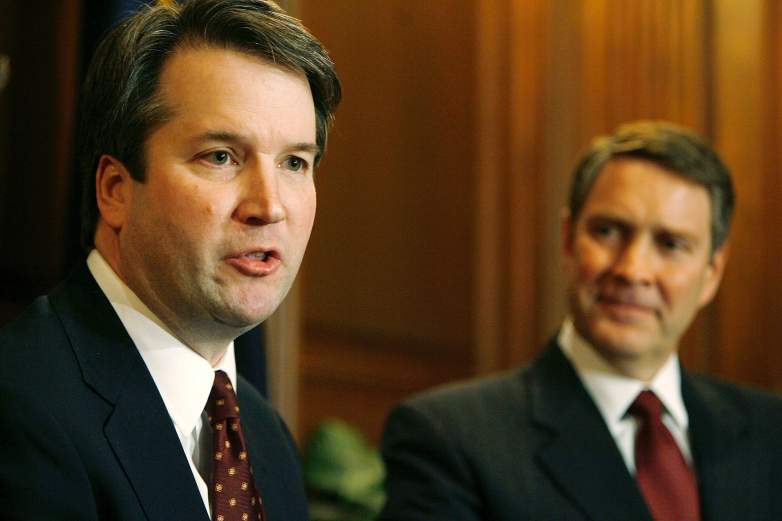
GettyBrett Kavanaugh (left) in 2004.
NARAL, which supports Roe v. Wade, issued a press release that criticized all of the president’s finalists on abortion, including Kavanaugh. “…nothing in their past would indicate that they are anything other than a likely vote to overturn Roe v Wade, criminalize abortion and punish women. Donald Trump repeatedly promised to only appoint anti-choice Justices and this list seems to to live up that promise,” NARAL wrote.
“All Senators should know a vote for any of these judges would be a vote to overturn Roe v Wade, criminalize abortion and punish women,” NARAL added.
NARAL released a list of concerns from the standpoint of the left. Among them: “He served as Senior Associate Counsel and in various other positions in the anti-choice George W. Bush White House. In these roles, he was responsible for ‘marshaling the fleet’ of George W. Bush’s far-right, anti-choice judicial nominees, including Priscilla Owen and William Pryor.”
NARAL also noted, “Kavanaugh is active in the conservative Federalist Society. He has contributed to anti-choice, extreme politicians including Henry Hyde and Orrin Hatch.”
In addition to criticizing Kavanaugh over the immigrant case, NARAL focused on this case: “In a heated dissent in Priests for Life v. HHS, Kavanaugh argued that the Affordable Care Act’s religious accommodation to the contraceptive-coverage policy placed a substantial burden on religious employers’ beliefs, even ‘if the religious organizations are misguided in thinking that this scheme…makes them complicit in facilitating contraception or abortion.'”
On the immigrant case, NARAL wrote, “Kavanaugh issued a strongly worded dissent against a D.C. Circuit decision that allowed an undocumented young woman to access abortion care. Kavanaugh argued that despite the fact that the girl had already met all of Texas’ burdensome requirements for young women seeking abortion care (mandatory delay, state court approval, etc.), she should have to wait until she had an immigration sponsor to make ‘that momentous life decision.'”
Read about Brett Kavanaugh’s controversial Obamacare dissent here:
